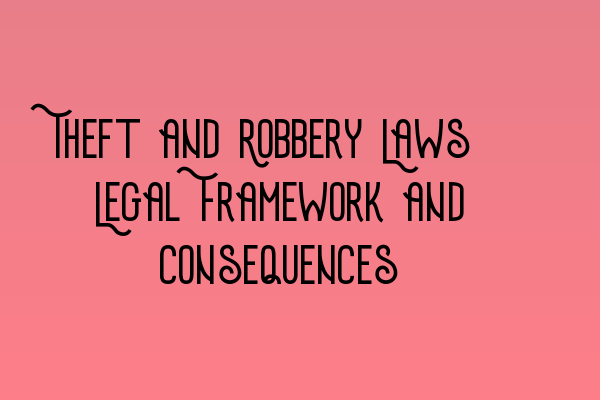Theft and Robbery Laws: Legal Framework and Consequences
When it comes to criminal offenses, theft and robbery are two prominent crimes that can have severe legal consequences. Understanding the legal framework surrounding these offenses is crucial to ensure proper defense and representation in court. In this article, we will delve into the key aspects of theft and robbery laws in the UK, including their definitions, penalties, and potential defenses.
Theft Laws in the UK
Theft is defined under section 1 of the Theft Act 1968. It encompasses the act of dishonestly appropriating property belonging to another with the intention to permanently deprive the owner of it. The law focuses on the element of dishonesty and intention to permanently deprive, which sets theft apart from other similar offenses.
The penalties for theft vary depending on the seriousness of the offense. For thefts involving low-value or non-aggravating factors, they are usually classified as a summary offense and may result in fines or community orders. However, more serious cases of theft, such as high-value or repeat offenses, can be prosecuted as indictable offenses and carry heavier penalties, including imprisonment.
If you find yourself facing theft charges, it is crucial to seek legal advice from experienced criminal defense solicitors to understand the best course of action. They can evaluate the circumstances of your case and provide you with expert guidance on potential defenses or mitigating factors.
Robbery Laws in the UK
Unlike theft, robbery involves the use or threat of force in the act of stealing. Section 8 of the Theft Act 1968 defines robbery as the unlawful taking of property from another person accompanied by either force, or the threat of force. The force or threat must be used in order to steal and must be immediate.
The offense of robbery is considered more severe than theft due to the element of violence or intimidation involved. As a result, the penalties for robbery are significantly higher. If convicted of robbery, the offender can face imprisonment for a considerable length of time, depending on the circumstances of the case.
It is important to note that the use of a weapon in the commission of a robbery can lead to even more severe penalties. Firearms or offensive weapons, such as knives, increase the seriousness of the offense and carry a higher risk of imprisonment.
Possible Defenses
When facing theft or robbery charges, understanding the available defenses can significantly impact the outcome of the case. Some common defenses include:
- Lack of intent: If it can be proven that there was no intention to permanently deprive the owner of the property, the charges of theft or robbery may be successfully challenged.
- Mistaken identity: If there is a possibility of mistaken identity, presenting evidence or witnesses that establish an alibi or alternative suspect can help in raising doubts about the reliability of the prosecution’s case.
- Consent: If the owner of the property consented to the defendant’s actions, it may serve as a defense, especially in cases where the issue of ownership or permission is questionable.
These defenses can be complex to navigate, and having professional legal representation is essential to ensure they are effectively presented in court. A skilled criminal defense solicitor will be able to assess the viability of these defenses and provide guidance based on the unique circumstances of your case.
Understanding the legal framework surrounding theft and robbery is essential for individuals studying for the SQE criminal law and practice exam. By mastering key concepts related to theft and robbery laws, aspiring solicitors can excel in this area of practice. For more information on preparing for the SQE exam, be sure to check out our related articles:
SQE Sample Papers: Practice for Exam Success
Focus Areas in SQE1 and SQE2: Mastering Key Concepts
Adjusting Your SQE Strategy Based on Mock Performance
SQE Mock Debrief Sessions: Critical Steps for Improvement
Post-Mock Feedback Sessions: Improving Your Performance
In conclusion, theft and robbery offenses carry significant legal consequences in the UK. It is essential to understand the legal definitions, penalties, and available defenses to ensure proper representation in court. If you are facing theft or robbery charges, seeking legal advice from experienced criminal defense solicitors can help protect your rights and improve your chances of a favorable outcome.
